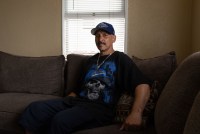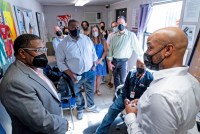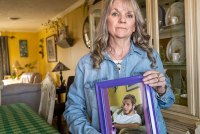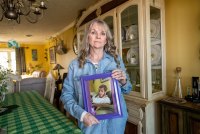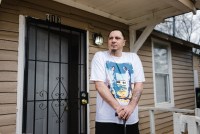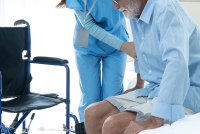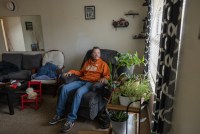Latest KFF Health News Stories
‘A System in Crisis’: Dysfunctional Federal Disability Programs Force the Poor to Pass Up Money
With little or no income, disability applicants are seeking Social Security early retirement benefits even though it could cost them tens of thousands of dollars in future income, lawyers say.
California Confronts Overdose Epidemic Among Former Prison Inmates
Individuals newly released from prison are 40 times as likely to die of opioid overdoses than members of the general population, researchers say. In response, California corrections officials aim to arm departing inmates with an antidote that can be used to reverse the effects of opioid poisoning.
El gobierno alerta sobre tarjetas de crédito para pagar facturas médicas
La Oficina de Protección Financiera del Consumidor estimó en su informe que, en solo tres años, de 2018 a 2020, las personas han estado pagando $1,000 millones en intereses diferidos de tarjetas de crédito médicas y otros financiamientos médicos.
What the Health? From KFF Health News: Health Programs Are at Risk as Debt Ceiling Cave-In Looms
A warning from the Treasury Department that the U.S. could default on its debt as soon as June 1 has galvanized lawmakers to intervene. But there is still no obvious way to reconcile Republican demands to slash federal spending with President Joe Biden’s demand to raise the debt ceiling and save the spending fight for a later date. Meanwhile, efforts to pass abortion bans in conservative states are starting to stall as some Republicans rebel against the most severe bans. Joanne Kenen of the Johns Hopkins Bloomberg School of Public Health and Politico, Rachel Cohrs of Stat, and Alice Miranda Ollstein of Politico join KFF Health News chief Washington correspondent Julie Rovner to discuss these issues and more.
Biden Administration Issues New Warning About Medical Credit Cards
Americans paid an estimated $1 billion in deferred interest on medical debt in just three years, the Consumer Financial Protection Bureau reports. The agency warns against medical credit cards, which are often pitched right in doctors’ offices.
How a 2019 Florida Law Catalyzed a Hospital-Building Boom
In Wesley Chapel, Fla., near Tampa, residents will soon have three general hospitals within a five-minute drive. The new construction is part of a hospital-building boom across Florida unleashed almost four years ago, when the state dropped a requirement that companies obtain government approval to open new hospitals.
US Officials Want to End the HIV Epidemic by 2030. Many Stakeholders Think They Won’t.
The federal government’s ambitious plan to end the HIV epidemic, launched in 2019, has generated new ways to reach at-risk populations in targeted communities across the South. But health officials, advocates, and people living with HIV worry significant headwinds will keep the program from reaching its goals.
The Big Squeeze: More Enrollees and Smaller Networks Plague Some ACA Plans
Despite record enrollment in health insurance plans under the Affordable Care Act, some consumers who bought coverage and agents who helped them do so have had a tough start to the new year: Many say it’s hard to find an in-network doctor or hospital.
What the Health? From KFF Health News: A Judicial Body Blow to the ACA
A federal judge in Texas has dealt a big setback to the Affordable Care Act. The same judge who tried in 2018 to declare the entire ACA unconstitutional has now ruled that the law’s main provisions for preventive care are unconstitutional and, therefore, unenforceable nationwide. Also this week, North Carolina became the 40th state to expand Medicaid under the ACA. Alice Miranda Ollstein of Politico, Rachel Cohrs of Stat, and Sandhya Raman of CQ Roll Call join KHN chief Washington correspondent Julie Rovner to discuss these issues and more.
Se pagarán $50,000 millones como liquidación del acuerdo sobre opioides. Veremos cómo se gastan
La mayoría de los acuerdos estipulan que los estados deben gastar al menos el 85% del dinero que recibirán, en los próximos 15 años, en el tratamiento y la prevención de adicciones.
$50 Billion in Opioid Settlement Cash Is on the Way. We’re Tracking How It’s Spent.
Spending the money effectively and equitably is a tall order for state and local governments, and a lack of transparency in the process is already leading to fears of misuse.
Truly Random Drug Testing: ADHD Patients Face Uneven Urine Screens and, Sometimes, Stigma
Doctors have no national standards on when to order urine tests to check whether adult ADHD patients are properly taking their prescription stimulants. Some patients are subjected to much more frequent testing than others.
Reentry Programs to Help Former Prisoners Obtain Health Care Are Often Underused
More than 600,000 people are released from prisons every year, many with costly health conditions but no medications, medical records, a health care provider, or insurance.
Montana Seeks to Insulate Nursing Homes From Future Financial Crises
Lawmakers are considering creating standards to set Medicaid reimbursement rates. But industry observers wonder whether the move would be too little, too late to bolster a beleaguered industry.
Ante vacío federal, estados promueven leyes duras contra el uso de sustancias tóxicas en cosméticos
Las hispanas y asiáticas han informado que usan más cosméticos en general que las mujeres negras y blancas no hispanas.
States Seek Crackdown on Toxic Ingredients in Cosmetics to Close Gaps in Federal Oversight
Washington state regulators found formaldehyde, lead, and arsenic in lipstick, powder foundations, skin lotions, and hair products marketed to and popular with women of color. Now legislators there are seeking to ban the products and, like at least a dozen other states, make up for lax federal rules.
A Law Was Meant to Free Sick or Aging Inmates. Instead, Some Are Left to Die in Prison.
The First Step Act was supposed to help free terminally ill and aging federal inmates who pose little or no threat to public safety. But while petitions for compassionate release skyrocketed during the pandemic, judges denied most requests.
Congress Told HHS to Set Up a Health Data Network in 2006. The Agency Still Hasn’t.
Since 2006, federal officials have been charged with setting up a network to let various parts of the U.S. health system share information during emergencies. It still hasn’t been built or even planned, even after the communication and data-sharing failures put on display during the pandemic.
Some Addiction Treatment Centers Turn Big Profits by Scaling Back Care
Private equity groups are cashing in on rising rates of alcohol and drug addiction in the U.S. But they aren’t necessarily investing in centers with the best treatment standards, and they often cut extra services.
Unmet Needs: Critics Cite Failures in Health Care for Vulnerable Foster Children
More states are moving to specialized managed-care contracts solely to handle medical and behavioral services for foster kids. But child advocates, foster parents, and even state officials say these and other care arrangements are shortchanging foster kids’ health needs.




